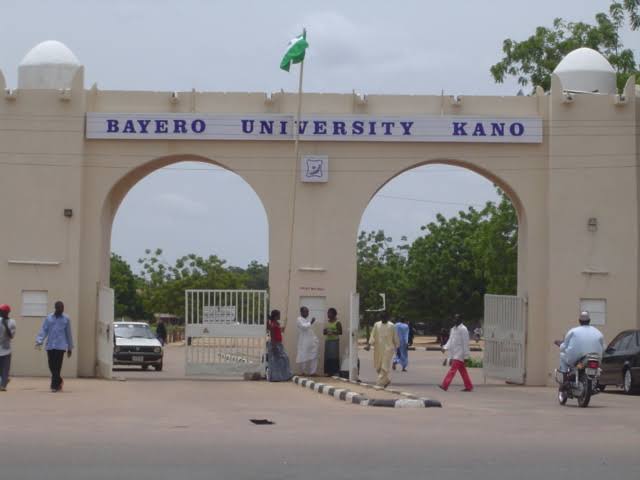News
NCC, stakeholders chart new path to effective telecoms regulation, industry growth

Nasiru Yusuf
The Nigerian Communications Commission (NCC) has hosted the second edition of the Nigerian Telecoms Leadership Summit, in line with its tradition and commitment to engage with stakeholders in the telecom ecosystem with a view to pursuing proactive regulatory interventions targeted at ensuring an enabling operating environment and improving investment climate in the Nigerian telecom industry.
KANO FOCUS reports that the event, which took place at the Eko Hotels, Victoria Island, Lagos, was an assemblage of key industry stakeholders with the central objective to analyse the current state of the sector, process the issues, and chart new pathways to a more effective and sustainable regulatory regime for the stability and growth of the Nigerian telecom industry.
Speaking at the event, the Executive Vice Chairman and Chief Executive Officer of the NCC, Prof. Umar Danbatta, said that the theme of the Summit: “The Future of Telecom Regulation in Nigeria,” presented a unique opportunity for the Commission to interact with critical stakeholders.
Through such interaction, the EVC said the Commission would be able to brainstorm and migrate to new frontiers of visionary regulations that will galvanise and foster desired growth in the industry.

Danbatta explained that the outbreak of the COVID-19 pandemic triggered political and socio-economic uncertainties globally and underscored the crucial role of digital connectivity in keeping societies functioning, as the online life became, essentially, new way of life.
He stated that with the increased dependence on digital platforms, the theme of the event had become necessary in order to put in place a broader regulatory framework that will enhance and protect the integrity of the industry in the emergent digital economy.
In this context, the EVC said the NCC will continue to diligently pursue the implementation of policy frameworks such as Nigeria National Broadband Plan (NNBP) 2020-2025; and the National Digital Economy Policy and Strategy (NDEPS) 2020-2030 which are consistent with NCC’s regulatory interventions such as the Commission’s Strategic Management Plan (SMP), 2020-2024 and Strategic Vision Plan (SVP), 2021-2025, among others.
Danbatta said all the policy and regulatory frameworks principally seek to provide a platform for Nigerian citizens to engage in innovative developments for the telecoms industry and improve the nation’s ability to compete in the ever-competitive global space.
Explaining further on the transformation happening as a result of the expanding spectrum of digital ecosystem, Danbatta said the industry is witnessing new business delivery and breakthroughs due to the expansion of boundaries of digital Small and Medium Enterprises (SMEs), especially fintech and e-commerce firms.
The EVC said those consequential ecosystem have contributed to the growth of the Nigerian digital economy riding on telecom infrastructure.
Danbatta aptly reckoned that digital services and contents provided by these SMEs will leverage on broadband infrastructure and the upcoming deployment of Fifth Generation (5G) network being driven by the Commission to deliver more innovative and high-quality experiences to consumers.
“The Commission’s successful auction and licensing of the 3.5GHz spectrum licences in the last quarter of 2021 for the deployment of 5G technology is set to creat many opportunities for the development of the industry and as a regulator, we are conversant with the fact that a dynamic regulatory environment is needed to sustain this industry growth”, Danbatta said.
“Therefore, it has become imperative for us, as critical stakeholders, to appraise the progress made so far as an industry and chart the course for the future of the telecoms industry in the country,” he stated.
The EVC also informed that one of the sectors that had been positively impacted by the digital transformation is the financial services sector.
Amplifiying the EVC’s position, in his keynote address titled: “The Future of Telecom Regulation in Nigeria: Challenges of Access to Funding”, the
Chief Executive Officer of Stanbic IBTC, Dr. Ademola Sogunle, asserted that the telecommunications industry had become the sustaining stimulus of the post-pandemic era as consumers’ behaviours continue to shift towards digital trends.
Danbatta said that the contribution of the telecom sector continues to benefit the entire ecosystem.
While reviewing resolutions of the first edition of the Summit held in 2019, the Director, Policy, Competition and Economic Analysis, NCC, Yetunde Akinloye, said the Commission had implemented the recommendations of that meeting among which were Executive Order on Duplicity of Taxes and Levies, and Harmonization of Right of Way (ROW) fees.
She said other recommendations implemented include addressing of interconnect debt, review of the framework on interconnect clearing houses to ensure 10 per cent of traffic is routed through clearing houses, incentive for small operators as well as monitoring compliance with Code of Corporate Governance.
To sustain the momentum from the previous industry leadership engagement, this year’s Summit provided the Chief Executives of companies in the telecom sector an opportunity to meet the EVC and top Management of the Commission at a roundtable for deeper thinking and greater reflection on the challenges in the sector and proffer meaningful solutions.

Headlines
BUK Achieves 100% Success in 2024 NUC Accreditation: 53 Programmes Fully Approved

Mu
Bayero University, Kano (BUK) has recorded a landmark academic achievement following the release of the results from the 2024 accreditation exercise conducted by the National Universities Commission (NUC).
In what has been described as a resounding endorsement of the University’s academic standards and quality assurance framework, all 53 academic programmes presented for evaluation were granted full accreditation or accredited status.
The accreditation, conducted between October and November 2024, covered undergraduate and postgraduate programmes across key faculties including Administration, Agriculture, Allied Health Sciences, Arts, Computing, Education, Engineering, Medicine, Pharmacy, Science, and Social Sciences.
According to a statement signed by the University Registrar, Haruna Aliyu, the development affirms BUK’s unwavering commitment to academic excellence, curriculum innovation, and sustained infrastructural and faculty development.

“This milestone is a testimony to the quality of education and institutional governance at BUK. It validates our position as one of Nigeria’s premier universities,” the statement said.
Key Highlights:
• Administration Faculty recorded full accreditation across 13 programmes including the Master of Accounting and Financial Management, MBA, and Islamic Banking & Finance.
• Agriculture, Medicine, Pharmacy, and all Engineering programmes received full accreditation, reinforcing the University’s strength in science-based disciplines.
• The Education Faculty had a sweeping success with 14 programmes earning full accreditation.
• Courses in Arts, Social Sciences, Computing, and Science were all rated “Full” by the NUC.
This success is more than academic—it means that all current and prospective students of these programmes can be assured that their education meets the highest national standards. It also ensures the continued recognition of their certificates for employment, postgraduate studies, and participation in national youth service.
Strengthening Nigeria’s Higher Education Landscape
The Registrar expressed appreciation to the National Universities Commission for its rigorous evaluation process and acknowledged the dedication of BUK’s Deans, Heads of Departments, academic staff, and support personnel who worked tirelessly to meet and surpass the benchmarks.
“This achievement is not an end but a motivation to continue pushing the boundaries of knowledge, research, and community engagement. We remain committed to nurturing leaders and innovators who will contribute meaningfully to Nigeria and the world,” he added.
As BUK celebrates this landmark, the University is inviting stakeholders, prospective students, parents, and the global academic community to partner in its journey of growth and excellence.

Headlines
Governor Yusuf Pays Over 3 Billion for Secondary School Students to Sit for NECO, NABTEB, NBAIS

Mukhtar Yahya Usman
The Governor of Kano State, Alhaji Abba Kabir Yusuf, has expended over 3 billion naira for 141,175 (one hundred and forty-one thousand, one hundred and seventy-five) Kano students who passed the 2024 qualifying examinations to sit for this year’s NECO, NABTEB, and NBAIS (2025).
In a statement issued by the Governor’s Special Adviser on Information, Ibrahim Adam, it was noted that the Commissioner for Education, Ali Haruna Makoda, announced to newsmen in Kano that the State Ministry of Education had released the results of the qualifying examinations for secondary school students in Kano.
These students are studying under the Kano State Teachers Service Board and the Science and Technical Schools Board, where 75 percent of them qualified to write the senior school certificate examinations of NABTEB, NECO, and NBAIS (for Arabic students).
Ali Haruna Makoda stated that the students eligible for payment by the Kano State Government under Alhaji Abba Kabir Yusuf are those who scored five credits and above.

The Commissioner maintained that all secondary school principals and directors should notify their students of their results so that the state government can effect the payment.
The 2025 qualifying exams for NECO, and NABTEB will enable the students to sit for their 2025 examinations required for admission into tertiary education.
Ibrahim Adam, the Special Adviser to Governor Yusuf on Information, said that since the inception of the administration in May 2023, it has settled registration fees for Kano indigent students for NECO, NABTEB, and NBAIS.
The Special Adviser pointed out that apart from settling the fees, Governor Yusuf’s administration has also paid huge outstanding debts for NECO, and NABTEB left behind by former Governor Abdullahi Umar Ganduje’s administration.
He also said it is part of Governor Yusuf’s declaration of a state of emergency on education and an effort to mitigate the high number of out-of-school children that have bedeviled the state.

Headlines
AGILE Kano commences inter school competition among adolescent girls, boys

The Adolescent Girls Initiative for Learning and Empowerment (AGILE) Project, Kano has commenced a week-long competition across selected secondary schools as part of its commitment to the holistic development of adolescent girls.
KANO FOCUS reports that the AGILE Week 2025 features volleyball, basketball, spelling bee, painting, poetry, essay writing, short story and content creation competitions.

GGC Dala VS GGC Kano
On Basketball Girls category, Government Girls College Dala won 1st position, Government Girls College Kano 2nd while Army Day Secondary School emerged 3rd, while on male category Ahmadiyya College won 1st position with Army Day Secondary School as runners up.

On volleyball Girls category Army Day Secondary School won 1st position, Government Girls College Dala emerged 2nd while Government Girls College Kano secured 3rd position, while on male category Government Girls Secondary School Minjibir won 1st position with Ahmadiyya College as runners up.

Basketball competition
Speaking during the ongoing AGILE Games 2025 Week activities at the Government Girls College (GGC) Gala, State Project Coordinator, Malam Mujtaba Aminu, explained the purpose of the event and its significance.
“We are here for the AGILE Week. It is a key programme under the Adolescent Girls Initiative for Learning and Empowerment Project. This initiative is designed to showcase talent and intellectual skills among adolescent girls,” he said.

Basketball Competition
Aminu noted that sporting activities were chosen to help build confidence, encourage healthy competition, and foster teamwork among girls.
“Yesterday, we held a basketball competition where the winners emerged, and today we are continuing with volleyball. The top players from these games will be selected to represent the state in a friendly match against Kebbi State next week.”

Malam Mujtaba Aminu and Nasiru Yusuf Ibrahim
According to him, the event is not just a one-off occurrence. “It’s an annual event designed for this purpose. Initially, it was rolled out in seven states, but now the programme has expanded to include 18 to 21 states. So, next year’s games and competitions will be even bigger.”

The AGILE Project, supported by the World Bank, aims to improve secondary education opportunities for adolescent girls in Nigeria by enhancing infrastructure, providing scholarships, and supporting life-skills programmes—of which AGILE Week is a vital component.
Nasiru Yusuf Ibrahim ANIPR,
Communication Officer,
AGILE Kano.













